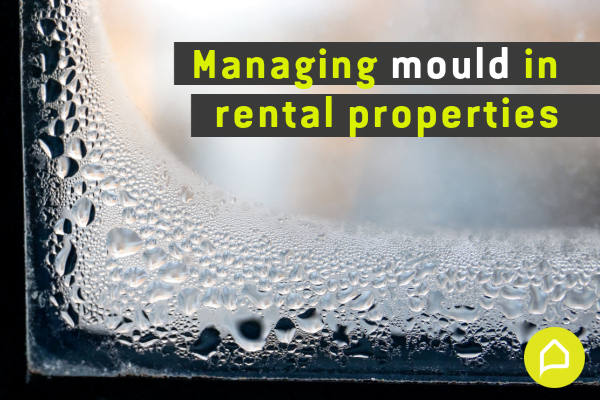As we continue through Winter, rainfall and humidity will inevitably be higher than usual. It’s during this time that we receive more urgent repair requests when homeowners and renters discover mould growth and mould-related structural damage. The most unwelcome of house guests, we always do our best to inspect properties and prevent this problem from rearing its head! This Think Property & Co blog unpacks why mould prevention and removal remains an important priority, and what rental providers and renters should know before beginning a tenancy.
What exactly is mould?
Mould is a type of fungi that can grow on plant and animal matter. It can be ‘fuzzy’ in appearance or present as a stain, smudge or discoloured patch. If left unchecked, it can cause structural damage to homes as well as health problems for occupants. Allergic reactions and respiratory infections are common as mould spores can become airborne.
What causes mould?
An unfortunate combination of wet weather and poor ventilation can encourage mould growth. It grows by producing mould spores, which tend to be eliminated by removing moisture and improving ventilation. Common building issues that are associated with mould include roof or wall leaks, plumbing leaks, faulty exhaust fans, poor water proofing in areas such bathrooms, and condensation from cooking, showering or drying clothes. By becoming aware of these causes, renters and homeowners can modify their spaces to control and prevent mould-related problems.
What do I need to know as a RENTAL PROVIDER?
Rental providers must take all reasonable steps to ensure renters enjoy secure, safe and comfortable living conditions. This includes staying on top of routine maintenance and repairs, and meeting the rental minimum standards which include prevention of mould and dampness. Properties will need to comply with these standards before a renter moves in, or during a lease renewal.
Of course, your property manager will be able to assist with queries and can provide recommendations that improve your investment. You can also find our nifty recap on Victoria’s updated rental laws here.
What do I need to know as a RENTER?
It’s important to carefully inspect rental properties before you sign a rental agreement. If you do notice any issues, flag them with your rental provider or property manager immediately. Renters can request an urgent repair to remedy dampness or mould-related problems, as it directly impacts health and safety in addition to maintaining the integrity of the rented premises. There is an increased limit in urgent repairs reimbursement should you find yourself needing a repair attended to immediately. Rental providers will need to reimburse the costs 7 days after receiving written notice.
TP&Co is proud to use Bricks+Agent to streamline communications between our property management team, clients, and network of qualified tradespeople and specialists. All parties will be kept in the loop with timely updates – urgent or not! Our previous blog unpacks everything you need to know about Bricks+Agent.
Both renters and rental providers should have an understanding of the minimum standards in a rental property and their obligations before beginning a new tenancy. You can view the full list of minimum standards on the Consumer Affairs Victoria website here. As always, Think Property & Co is ready to answer any questions should you need additional information or clarification. We are dedicated to ensuring our clients enjoy a memorable and long-term leasing experience that’s #BetterForEveryone!

